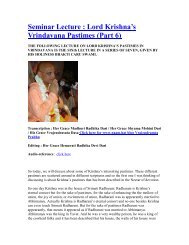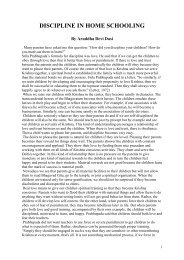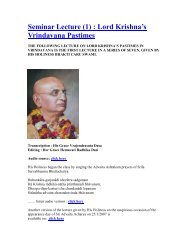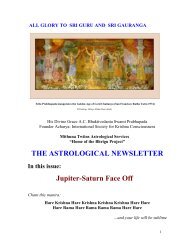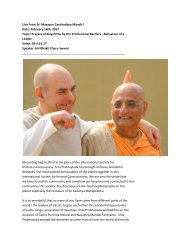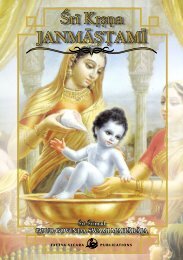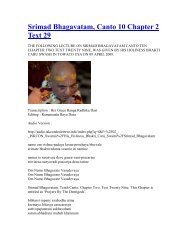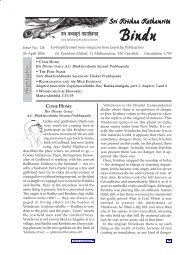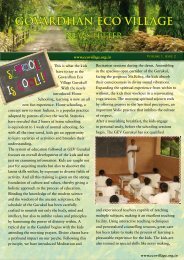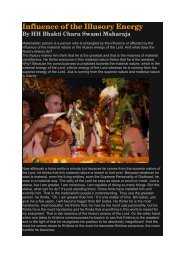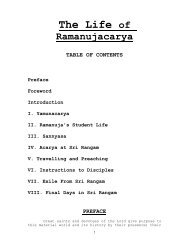Madhusudan Masa - The Eight Petals - ebooks - ISKCON desire tree
Madhusudan Masa - The Eight Petals - ebooks - ISKCON desire tree
Madhusudan Masa - The Eight Petals - ebooks - ISKCON desire tree
You also want an ePaper? Increase the reach of your titles
YUMPU automatically turns print PDFs into web optimized ePapers that Google loves.
<strong>Madhusudan</strong> Mas<br />
Volume: 02<br />
Issue: May’10 – June’10<br />
<strong>The</strong> Vedic Teachings<br />
“<strong>The</strong> devotees of the Lord are released from all kinds of sins because they eat food which is offered<br />
first for sacrifice. Others, who prepare food for personal sense enjoyment, verily eat only sin.”<br />
[Bhagavad-gita 3.13]<br />
"All living bodies subsist on food grains, which are produced from rains. Rains are produced by<br />
performance of yajïa [sacrifice], and yajïa is born of prescribed duties." [Bg. 3.14]<br />
“But Kåñëa does not say that "You open slaughterhouse and industries and brothels and cinema." No. Kåñëa<br />
does not say. Kåñëa says, "Grow more food, rascal! You'll eat and become strong." And nobody is obeying<br />
Kåñëa. Is it not? Practically try to understand Bhagavad-gétä and Çrémad-Bhägavata. Not by sentiment.<br />
And preach this philosophy all over the world.” [Srila Prabhupada’s Lecture, SB 1.8.18, Sri Mayapur,<br />
1974]<br />
“<strong>The</strong> influence of food grains remains in the body for five days, the influence of milk for seven days, the<br />
influence of yogurt for twenty days and the influence of ghee for one month. For a person who does not eat<br />
cow products for one month, his food is shared by ghosts... a house that does not have a cow is<br />
inauspicious.” [Padma Purana, Srsti Khanda 57/151-156]<br />
<strong>The</strong> above quotes from ancient Vedic literatures such as Bhagavad-gita and Srimad-Bhagavatam give<br />
us a clear insight as to how food grains and the cows played a vital role in the lives of the Aryan<br />
people. Aryan is defined as “a follower of Vedic culture, a person whose goal is spiritual advancement. He<br />
truly knows the value of life and has a civilization based on spiritual realization” [VedaBase-Folio].<br />
<strong>The</strong> Aryan civilization naturally considered life to be sacred. <strong>The</strong> real goal of life was first and<br />
foremost self-realization. Agrarian based, the Aryan people produced what they needed locally and<br />
depended on cows and the ox. Before eating any food, they would offer it to God in a gesture of deep<br />
respect and recognition. <strong>The</strong> sanctified food was then honoured as prasadam, the mercy of the Lord.<br />
Such a society, based on the principles of God consciousness, was satisfied with the basic necessities<br />
of life and respected the laws of nature.<br />
What most people of modern day society fail to understand is that nature, God’s nature, has a built-in<br />
system which is the most scientific, balanced and planned system. When this divine plan is honoured<br />
and respected, all opulences and peace follow. When ignored or rejected, scarcity and calamity follow<br />
naturally.<br />
Today’s modern society has chosen to ignore, and in some cases outright reject, this simple plan of<br />
nature. Although having greatly advanced in material pursuits due to sophisticated technology and<br />
industry, although priding themselves in having the largest number of scientists, researchers and<br />
learned scholars in known history, and although having had many decades to demonstrate their<br />
knowledge and experience, modern day leaders and scientists have failed miserably to provide even<br />
enough food for the people on the planet, the result of which is severe sufferings to humans and<br />
animals alike. And whatever food they are providing has been de-naturalized through the use of<br />
chemical pesticides and chemical fertilizers to such an extent that the soil from which food is<br />
produced and the food itself is a threat to the environment and the general health of people on a scale<br />
never before witnessed on the planet. Millions die of starvation every year while a greater number<br />
suffer from hunger and lack of proper nutrition. <strong>The</strong> main reason is simply lust and greed, what the<br />
ancient teachings of the Bhagavad-gita describe as the two greatest enemies of mankind.<br />
Practical Solutions<br />
Grow Your Own Food<br />
<strong>The</strong> Vedic culture advocates an agrarian based lifestyle where the vast majority of individuals in<br />
society live in villages and grow their own food. Practically all householders maintain their own cows<br />
Make Vrndavan Villages



